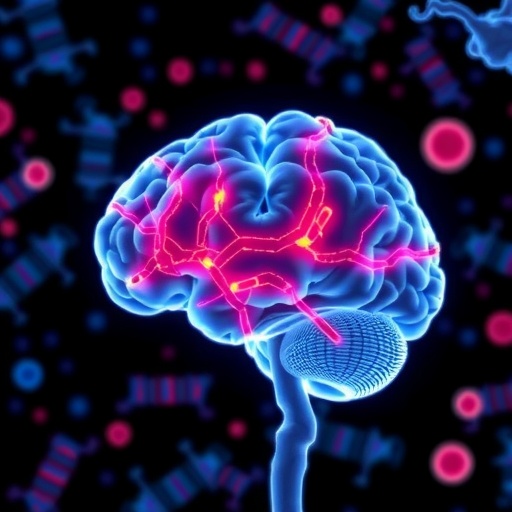Recent advances in neurological research have opened new avenues for understanding the underlying mechanisms of acute ischemic stroke (AIS). In a pivotal study, researchers Jin, Li, and Li have shed light on the dynamic expression patterns of immune-related genes in the peripheral blood of patients suffering from AIS. This groundbreaking work not only elucidates the role of the immune system in the pathophysiology of stroke but also presents potential biomarkers for diagnosis and therapeutic targets for effective intervention.
Acute ischemic stroke is characterized by the rapid loss of brain function due to inadequate blood supply, primarily caused by clot formation that occludes blood vessels. Understanding the immune response during this critical event is paramount, as various immune cells traffic to the site of injury, orchestrating an inflammatory response that can either facilitate recovery or exacerbate neuronal damage. The study by Jin and colleagues explores how these immune genes fluctuate in expression during the acute phase of stroke, offering fresh insights into their potential roles.
The researchers meticulously analyzed blood samples from AIS patients, employing advanced genomic technologies that allowed for comprehensive profiling of immune gene expression. Their findings revealed a significant alteration in the levels of various immune-related transcripts during the acute phase of stroke. Notably, the data suggested distinct patterns of expression that correlate with patient outcomes, opening the door to understanding how these immune markers might predict recovery trajectories in stroke patients.
One of the most intriguing aspects of this study is the identification of specific biomarkers that may serve as prognostic tools. By correlating gene expression profiles with clinical outcomes, the researchers identified genes that could indicate not only the severity of the stroke but also the likelihood of functional recovery. This precision in stratifying patients based on immune gene expression could dramatically enhance clinical decision-making and lead to personalized therapeutic approaches.
Moreover, the relationship between inflammation and ischemic stroke is multifaceted. It is well-established that a robust inflammatory response can lead to secondary injury, yet the same immune response is crucial for tissue repair and regeneration. This study highlights how a nuanced understanding of immune gene dynamics can inform therapeutic strategies that balance the inflammatory response, potentially improving long-term outcomes for AIS patients.
In addition to potential clinical applications, the research offers broader implications for the field of stroke research and immunology. By mapping the complex networks of immune genes involved in the acute phase of stroke, the work contributes to a foundational understanding that could spur further investigations into the interplay between the nervous and immune systems. Such knowledge is vital, as it could inform the development of novel immunomodulatory therapies aimed at enhancing recovery after stroke.
Interestingly, the study’s design also underscores the importance of longitudinal analysis in capturing the temporal dynamics of immune responses. Traditional approaches often provide a snapshot of biological processes, but this research illustrates that the evolution of immune gene expression is critical for painting a complete picture of the patient’s inflammatory landscape. Future research that builds on these findings could explore the long-term shifts in immune gene expression post-stroke and their implications for chronic stroke outcomes.
However, researchers acknowledge the need for caution in translating these findings into clinical practice. While the study establishes a vital connection between immune gene expression and stroke pathology, further validation is required to confirm these biomarkers’ specificity and sensitivity. Comprehensive multi-center studies will be crucial in ensuring that these findings are robust across diverse patient populations and clinical settings.
Moreover, as the understanding of the immune response in ischemic stroke expands, it provides an essential framework for investigating other neurological conditions. The immune system’s role in neurodegenerative diseases, traumatic brain injury, and other cerebrovascular disorders could potentially benefit from similar research methodologies, paving the way for a more integrative approach to neurological health.
Particularly relevant are the implications for developing targeted therapies that modulate immune responses. The identification of key immune pathways involved in stroke suggests potential avenues for pharmacological intervention aimed at optimizing clinical outcomes. Such therapies could range from strategies to mitigate excessive inflammation to enhancing neuroprotective immune processes, potentially revolutionizing stroke management paradigms.
The significance of this research cannot be overstated, as it aligns with the growing recognition of the immune system’s integral role in brain health. As scientists continue to unravel the complexities of stroke pathology, studies like these provide critical insights that could translate into tangible benefits for patients. The journey towards effective therapies necessitates a multi-disciplinary approach, merging neurology, immunology, and genomics.
In conclusion, the investigation by Jin and colleagues represents a landmark contribution to stroke research, enhancing our understanding of how immune gene expression patterns evolve in response to acute ischemia. The implications are far-reaching, suggesting new pathways for prognosis and treatment in AIS patients while laying the groundwork for future research exploring the intricate relationships between the immune system and neurological processes.
Moving forward, continued collaboration among researchers, clinicians, and biotechnologists will be essential in translating these scientific discoveries into clinical practice. A collective effort will ensure that insights gained from immune gene research lead to innovations that can ultimately reduce the burden of stroke and improve patient outcomes worldwide.
Subject of Research: Acute Ischemic Stroke and Immune Gene Expression Patterns
Article Title: Identification of the Dynamic Expression Patterns of Immune Genes in the Peripheral Blood of Acute Ischemic Stroke Patients
Article References: Jin, J., Li, L., Li, D. et al. Identification of the Dynamic Expression Patterns of Immune Genes in the Peripheral Blood of Acute Ischemic Stroke Patients. Biochem Genet (2025). https://doi.org/10.1007/s10528-025-11275-0
Image Credits: AI Generated
DOI: https://doi.org/10.1007/s10528-025-11275-0
Keywords: Acute Ischemic Stroke, Immune Gene Expression, Prognostic Biomarkers, Inflammation, Neuroprotection
Tags: acute ischemic stroke researchadvances in stroke research methodologiesbiomarkers for stroke diagnosisblood sample analysis in stroke patientsdynamic immune response during acute strokegenomic profiling of immune genesimmune gene expression patternsinflammatory response in strokemechanisms of neuronal damage in strokeneuroinflammation and stroke recoveryrole of immune system in stroketherapeutic targets for stroke intervention





